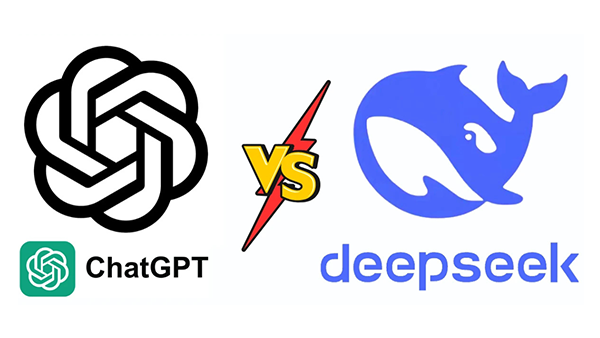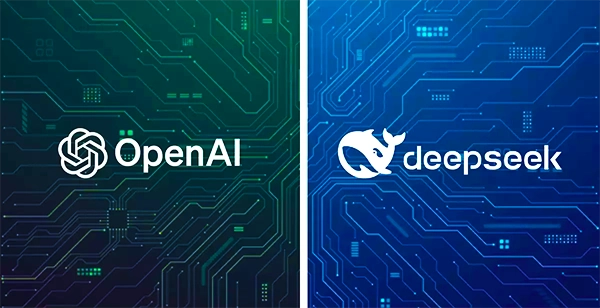Almost every creation from China surprises the global market because they produce good, modern products at a cost.
This time, the rise of the Chinese AI app DeepSeek has shocked financial markets, and US President Donald Trump has described it as a “wake-up call” for the US tech industry. He thinks DeepSeek will overtake ChatGpt.
DeepSeek claim that its R1 artificial intelligence (AI) model was developed at a fraction of the cost of its rivals has raised questions about the future of the entire industry and has reduced the value of some of the world’s largest companies.
DeepSeek has become the most downloaded free app in the US just a week after its launch.
So how does it compare to its much more established and apparently much more expensive US rivals, such as OpenAI’s ChatGpt and Google’s Gemini?
DeepSeek vs. ChatGPT

DeepSeek has been a hot topic in the tech world for a few days now. The 'DeepSeek AI' model developed by Chinese artificial intelligence company DeepSeek is being discussed a lot on social media. Within a few days of its release in the US market, it has topped the list of most downloaded free apps on the Apple | Store. As a result, China has threatened the dominance of the US in the world of artificial intelligence. In this article, we will discuss the difference between DeepSeek and ChatGPT.
What is DeepSeek?
DeepSeek is an AI-driven content generation platform, designed to assist with information, problem-solving, and task automation. DeepSeek can help with a wide range of topics, from technical guidance to general knowledge. DeepSeek aims to make your life easier by providing accurate and helpful feedback.
What is ChatGPT?
ChatGPT, developed by OpenAI, is a conversational AI model based on the GPT (Generative Pre-trained Transformer) architecture. It’s designed to generate human-like text based on user prompts. ChatGPT is widely used for content creation, brainstorming, coding assistance, and even casual conversation
Key Features Comparison
|
Feature |
DeepSeek |
ChatGPT |
|
Language Model |
Proprietary Transformer-based LLM |
GPT-4 / GPT-5 |
|
Context Handling |
Strong long-context memory |
Improved contextual recall |
|
Reasoning Ability |
Strong in deep logic and knowledge retrieval |
Excellent in problem-solving and creativity |
|
Multilingual Support |
Strong (focus on Asian languages) |
Extensive global language support |
|
Code Generation |
Competitive but developing |
Advanced and widely used |
|
Integration Capabilities |
API-friendly, optimized for efficiency |
Strong ecosystem with OpenAI APIs |
|
Fine-tuning Options |
Custom fine-tuning options for enterprises |
Some fine-tuning available |
|
User Experience |
High efficiency, fast responses |
Highly intuitive, with adaptive responses |
|
Ethical Safeguards |
Emphasis on data privacy |
OpenAI’s Reinforcement Learning with Human Feedback (RLHF) |
Who uses DeepSeek?
-
Students: Students use DeepSeek to prepare notes and research papers on various topics.
-
Teachers and professors: They use DeepSeek to create various educational content and to assist in teaching.
-
Researchers: Researchers rely on DeepSeek to prepare research projects and papers.
-
Digital marketers: For content creation, market trend analysis, and advertising.
-
Web developers: To get help with website content creation and development projects.
Who uses ChatGPT?
-
Students: To get help with homework, projects, and research.
-
Professionals: To get help with business communication, documentation, and report creation.
-
Writers and creative professionals: To create content ideas, articles, and stories.
-
General users: For general knowledge and entertainment.
-
Digital marketers: To create marketing strategies, slogans, and promotional campaigns.
-
Web developers: Coding assistance and web development problem solving.
DeepSeek vs. ChatGPT – Advantages & Disadvantages

|
Feature |
DeepSeek ✅ |
ChatGPT ✅ |
|
Logical Reasoning |
Strong, deep knowledge retrieval |
Good, but sometimes lacks deep precision |
|
Multilingual Support |
Strong, especially in Asian languages |
Extensive, with broad global coverage |
|
Creativity & Conversation |
Less refined for natural conversation |
Leading in creative and human-like interaction |
|
Enterprise Customization |
Highly flexible for businesses |
Some customization available, but limited |
|
Response Speed & Efficiency |
Optimized for fast responses |
Efficient but varies with query complexity |
|
Industry Adoption |
Growing, but mainly in niche markets |
Widely used across industries |
|
API & Integration |
Developing, fewer third-party integrations |
Strong API support and ecosystem |
|
Ethical Safeguards |
Focused on data privacy |
Advanced RLHF for ethical AI use |
|
Cost Efficiency |
Competitive pricing for enterprises |
Can be costly for high-volume users |
|
Use Cases |
Best for logic-heavy, multilingual, and enterprise applications |
Best for general AI tasks, creativity, and support |
Strengths and Weaknesses
DeepSeek Strengths:
✔️ Advanced knowledge retrieval and reasoning
✔️ Efficient response generation
✔️ Competitive in multilingual tasks
✔️ Customization-friendly for enterprises
❌ Still gaining adoption outside of Asia
❌ Less widespread third-party integration
ChatGPT Strengths:
✔️ Leading in creativity and conversational depth
✔️ Large-scale adoption across industries
✔️ Strong API and integration ecosystem
✔️ Ethical AI safeguards and compliance
❌ Can be expensive for high-volume users
❌ Some limitations in handling very niche topic
Both DeepSeek and ChatGPT have their strengths and cater to different audiences. While DeepSeek is emerging as a powerful AI tool with a focus on logic-heavy applications and multilingual capabilities, ChatGPT continues to lead in creativity, conversational AI, and industry adoption. Enterprises looking for cost-effective, customizable AI solutions may find DeepSeek appealing, whereas those seeking an established AI with strong API support and a broad user base will likely prefer ChatGPT.
The AI showdown between DeepSeek and ChatGPT will continue to evolve, shaping the future of artificial intelligence in 2025 and beyond
